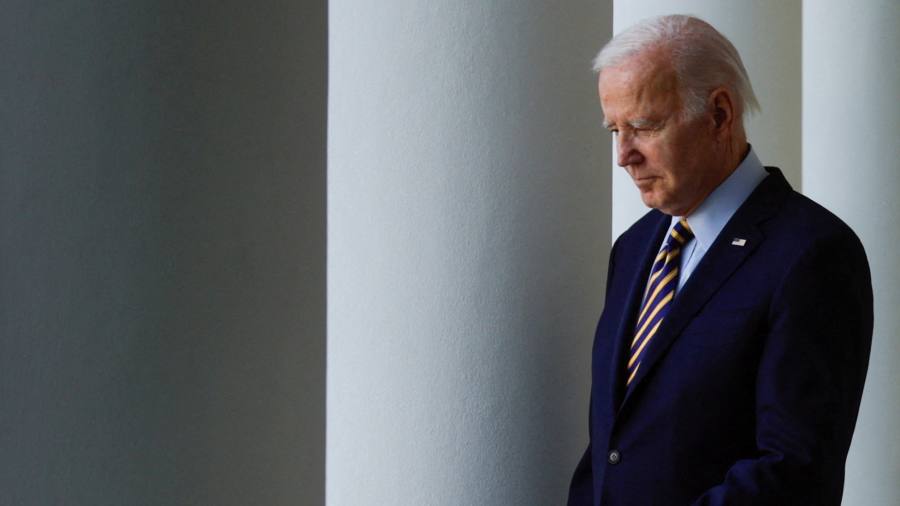It’s not the first time a White House pivot to Asia has fallen victim to events. Barack Obama tried to end the habit of US presidents spending all their foreign policy energy in the Middle East, only to be swamped by the spread of the Islamist militant group Isis and the civil war in Syria. This week, Joe Biden has been distracted by events even closer to home, specifically that troubled enclave of partisan strife known as Capitol Hill. He cancelled a trip to Australia following this weekend’s G7 summit in Japan.
Biden’s return to Washington is apparently required to fix the debt-ceiling stand-off in Congress, a regular piece of disingenuous showmanship by congressional Republicans aiming to cripple a Democratic president’s room for manoeuvre under the guise of fiscal responsibility.
It’s particularly embarrassing for the US that Biden will be unable to keep his appointment in Australia for the summit of the four-nation Asia-Pacific security Quad, which also involves India and Japan. Through its membership of the Quad, the Aukus military alliance (including the UK) and its defiance of Chinese trade coercion over its call for an inquiry into the origins of Covid, Australia — which will also attend the G7 — is the very model of an Asia-Pacific geostrategic ally.
US domestic dysfunction likewise forced Obama to cancel an Asia-Pacific trip, including a key negotiating summit for trade, in 2013, because the Republicans forced a similarly pointless shutdown of the federal government. But deteriorating relations between the US and China and the latter’s increasing dominance of Asia-Pacific regional supply chains has only made the weakness more obvious.
Biden’s aim of creating a counterweight strategic trade alliance to China has consistently struggled against his domestic imperatives. He has felt the need to favour US-owned businesses in his green spending splurge, both to keep the labour union wing of the Democrats happy and to get support from West Virginia’s Joe Manchin, the swing vote in the Senate.
But that has seriously weakened his suggestion that the US version of a green transition is part of a unified international campaign of advancing secure trade and technology that other countries can sign up to. The US’s economic pitch to the Asia-Pacific has been hobbled by his administration’s aversion to formal trade agreements, which has meant substituting the lightweight Indo-Pacific Economic Framework deals for anything involving real access to the US market.
When Biden came to power, the hope among trading partners was that his foreign policy veteran’s instinct towards alliances would outweigh, or at least counterbalance, his need to play to the Democratic base. In reality, this has only partially worked out.
Biden is trying to construct coalitions on trade-related issues, certainly. But they more resemble the traditional US military approach — evident for example in the 2003 invasion of Iraq — of designing a campaign and then pressing others to join in rather than negotiating a joint approach from scratch or working through multilateral forums. During preparations for the G7 summit, the US pushed two hardline ideas, a US-led common approach against Chinese economic coercion and a total ban on exports to Russia, which its G7 partners reject in anything like the form Washington envisaged.
At the back of his allies’ minds must always be the realisation that in less than two years’ time, the White House could be occupied by a president — most likely Donald Trump — from a dysfunctional Republican party with a highly unreliable commitment to international alliances. Republican support has been weakening even on Ukraine, the one issue on which pretty much all rich democracies agree.
You can forgive America’s G7 partners for declining to join a gang to confront China or Russia with a US whose next president might very well go rogue and take extraordinary unilateral action against Beijing — or abandon the defence of Ukraine for whatever expedient deal with Moscow he can throw together.
Biden’s coalition-building instincts are genuine, as is his commitment to slowing climate change. But his allies have now had more than two years to see that those motives are compromised by domestic imperatives both within his electoral base and from the Republican opposition. A divided home front is not how the cold war against the Soviet Union was conducted. America’s limitations as a geoeconomic power mean its relations with its supposed allies will always be more transactional than the White House would like.
alan.beattie@ft.com
Read the full article here




